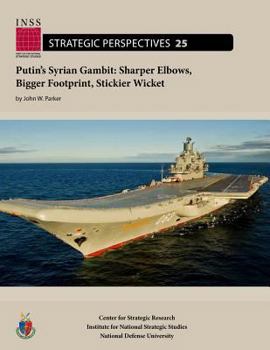Putin's Syrian Gambit: Sharper Elbows, Bigger Footprint, Stickier Wicket
Thanks in large part to Russia's military intervention, Syrian president Bashar al-Asad'sfortunes have made a remarkable recovery since May/June 2015. Russia, together with the LebaneseHizballah, Iran, and Iranian-organized Shia militias from Iraq, Afghanistan, Pakistan, andelsewhere, has succeeded in averting Asad's military defeat. What Russian president VladimirPutin has accomplished in Syria is important for American national security interests and policyin the region because it frames some of the hard choices Washington must now make.Russia has profited from a hard core of Alawite and Christian support for Asad insideSyria. At the same time, U.S. reluctance to become militarily involved in Syria facilitated themove of Russian forces into the country. Russia also benefited from the disunity among thediverse opposition to Asad and their external patrons. While Saudi Arabia and Turkey wereboth early proponents of ousting Asad, Saudi Arabia is now more focused on defeating Houthirebels in Yemen, and Turkey on fighting Kurdish separatist forces in northern Syria. In returnfor help from Putin in resolving its Kurdish problem, Turkey in 2016 helped Putin resolve Russia'sAleppo problem.As President Donald Trump considers and implements a way forward on working withRussia in the fight against the Islamic State of Iraq and al-Sham (ISIS) and toward peace in Syria, events of the past several years underscore several fundamental constraints under which Putinwill be operating and some challenges that have been overstated.First, Russia will find it hard to deliver Asad's agreement to any political arrangement thatrequires him to step aside to bring the conflict to an end. Asad plays Russia off against Iran andthe Lebanese Hizballah, placing them all on the same level and extending no preference to Putinfor Russia's contribution to his survival.Second, Tehran will not be keen to see its leverage in Damascus diminish and that of Moscowgrow. Tehran will support Asad in his resistance to any Russian pressure that would impactwhat Tehran sees as its existential interests in Syria as a vital link in Iran's land bridge to theLebanese Hizballah.Third, while working with Iran militarily in Syria, Russia has successfully pursued engagementwith most major Sunni powers in the Middle East, most interestingly Saudi Arabia, as wellas with Israel. However unpopular on "the street," Putin and Gulf Sunni royals appear to haveno complexes about dealing with each other.Fourth, Putin does not want Syria to be a "negative" issue going into the next Russianpresidential elections, scheduled for March 2018. This may be the major reason he has wanted to "solve" Aleppo so quickly in 2016 and pivot again to peacemaking efforts more prominence.Cooperation with the Trump administration and renewed American treatment of Russia as a"respected equal" would make Syria a more manageable electoral issue for Putin.As Washington continues to formulate and fine-tune a new approach to fighting ISIS andterrorism under the Trump administration, this study makes the following policy recommendations.First, the United States must cast aside sentiment and strictly prioritize its objectivesand preferred or acceptable outcomes.Second, the United States should work toward a Syria that remains unified even as theAmerican fight against ISIS benefits from Syrian Kurdish military prowess. The Kurds should bepart of the mix in political negotiations going forward but only in the context of a unified Syriaat the end of the process
Format:Paperback
Language:English
ISBN:1974219917
ISBN13:9781974219919
Release Date:January 1
Publisher:Createspace Independent Publishing Platform
Length:108 Pages
Weight:0.59 lbs.
Dimensions:0.2" x 8.5" x 11.0"
Customer Reviews
0 rating





